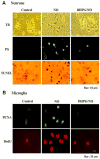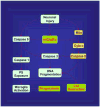Driving cellular plasticity and survival through the signal transduction pathways of metabotropic glutamate receptors
- PMID: 16375723
- PMCID: PMC2258008
- DOI: 10.2174/156720205774962692
Driving cellular plasticity and survival through the signal transduction pathways of metabotropic glutamate receptors
Abstract
Metabotropic glutamate receptors (mGluRs) share a common molecular morphology with other G protein-linked receptors, but there expression throughout the mammalian nervous system places these receptors as essential mediators not only for the initial development of an organism, but also for the vital determination of a cell's fate during many disorders in the nervous system that include amyotrophic lateral sclerosis, Parkinson's disease, Alzheimer's disease, Huntington's disease, Multiple Sclerosis, epilepsy, trauma, and stroke. Given the ubiquitous distribution of these receptors, the mGluR system impacts upon neuronal, vascular, and glial cell function and is activated by a wide variety of stimuli that includes neurotransmitters, peptides, hormones, growth factors, ions, lipids, and light. Employing signal transduction pathways that can modulate both excitatory and inhibitory responses, the mGluR system drives a spectrum of cellular pathways that involve protein kinases, endonucleases, cellular acidity, energy metabolism, mitochondrial membrane potential, caspases, and specific mitogen-activated protein kinases. Ultimately these pathways can converge to regulate genomic DNA degradation, membrane phosphatidylserine (PS) residue exposure, and inflammatory microglial activation. As we continue to push the envelope for our understanding of this complex and critical family of metabotropic receptors, we should be able to reap enormous benefits for both clinical disease as well as our understanding of basic biology in the nervous system.
Figures



References
-
- Aarts MM, Tymianski M. Novel treatment of excitotoxicity: targeted disruption of intracellular signalling from glutamate receptors. Biochem Pharmacol. 2003;66(6):877–86. - PubMed
-
- Aarts MM, Tymianski M. Molecular mechanisms underlying specificity of excitotoxic signaling in neurons. Curr Mol Med. 2004;4(2):137–47. - PubMed
-
- Abraham KE, McGinty JF, Brewer KL. The role of kainic acid/AMPA and metabotropic glutamate receptors in the regulation of opioid mRNA expression and the onset of pain-related behavior following excitotoxic spinal cord injury. Neuroscience. 2001;104(3):863–74. - PubMed
-
- Agrawal SK, Theriault E, Fehlings MG. Role of group I metabotropic glutamate receptors in traumatic spinal cord white matter injury. J Neurotrauma. 1998;15(11):929–41. - PubMed
-
- Albasanz JL, Dalfo E, Ferrer I, Martin M. Impaired metabotropic glutamate receptor/phospholipase C signaling pathway in the cerebral cortex in Alzheimer’s disease and dementia with Lewy bodies correlates with stage of Alzheimer’s-disease-related changes. Neurobiol Dis 2005 - PubMed
Publication types
MeSH terms
Substances
Grants and funding
LinkOut - more resources
Full Text Sources
Research Materials
